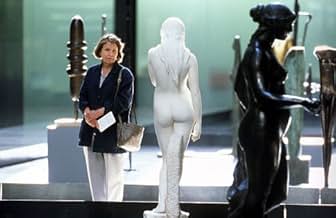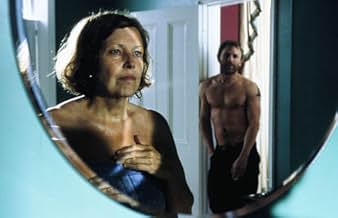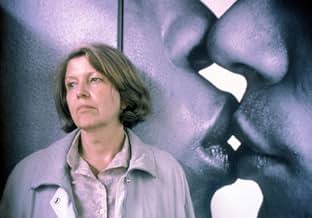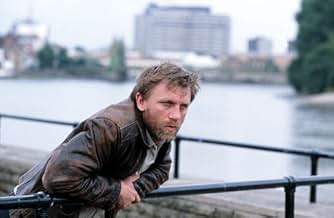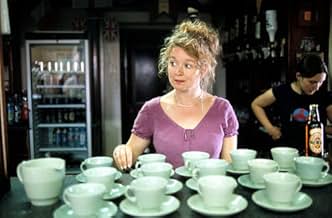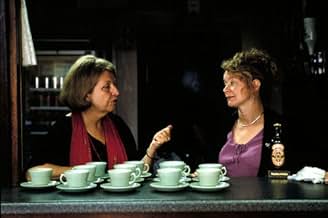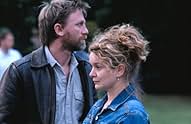IMDb RATING
6.7/10
4.9K
YOUR RATING
A woman has a passionate affair with a man half her age, who is also sleeping with her daughter.A woman has a passionate affair with a man half her age, who is also sleeping with her daughter.A woman has a passionate affair with a man half her age, who is also sleeping with her daughter.
- Nominated for 1 BAFTA Award
- 2 wins & 14 nominations total
Danira Govic
- Au Pair
- (as Danira Govich)
Zelda Tinska
- Barmaid
- (uncredited)
- Director
- Writer
- All cast & crew
- Production, box office & more at IMDbPro
Featured reviews
It's hard to imagine a director capable of such godawful crap as 'Notting Hill' pulling off something as sensitive and as attractive as this, but well, here's the evidence and it's quite compelling. Several have alluded to TV drama, and yes, this does have a seventies Play for Today feel at times, but is always a cut above, mainly I think owing to some quite superlative acting from Anne Reid and to a fine script which shadow-boxes with cliché without ever getting one on the nose, except maybe right at the end. (I didn't like either the tracking shot of indifferent goodbyes through the hallway, nor the oh-what-a-beautiful-morning final scene: she deserved a more studied finale than that I think, after all that hard work. The slippers business was a bit OTT too, on reflection).
What I mean about avoiding cliché: well, I for one had a sinking expectation that the "mature" man May's daughter tries to set her up with would be cast in 2 dimensions as a repulsive old bore, so as to point the contrast more painfully with the attractive, virile young geezer he is unwittingly competing with. Instead, we get an unexpectedly subtle and sympathetic cameo of a lonely, clumsy, not entirely unlikeable and very human fellow, who nevertheless doesn't have much of a clue about entertaining a woman. It was around that point I started to sit up and pay more attention. Here was a script that let the actors breathe and do something interesting with fairly minor parts. Almost Mike Leigh in that respect (minus the contrived catharses that the latter inexplicably goes in for).
And of course I was, as everyone probably was, dumbfounded by what Anne Reid does with her character and with her body. She's /not/ "the repressed, dutiful housewife discovering herself for the first time", this is far too simplistic for the character we have. Again and again there are allusions to her having been a "bad housewife", not to mention that thing she does with trays, trying to look nurturing and comely and only succeeding in looking awkward. The daughter accuses her of having "sat in front of the TV all day" instead of, well, whatever her motherly duties might be presumed to have been: she has no answer. She never was a model wife and mother, at least not to herself - that's where a lot of the poignancy comes from, the sense of someone having wasted a life trying to fulfil a role she simply wasn't good at, ever.
What I mean about avoiding cliché: well, I for one had a sinking expectation that the "mature" man May's daughter tries to set her up with would be cast in 2 dimensions as a repulsive old bore, so as to point the contrast more painfully with the attractive, virile young geezer he is unwittingly competing with. Instead, we get an unexpectedly subtle and sympathetic cameo of a lonely, clumsy, not entirely unlikeable and very human fellow, who nevertheless doesn't have much of a clue about entertaining a woman. It was around that point I started to sit up and pay more attention. Here was a script that let the actors breathe and do something interesting with fairly minor parts. Almost Mike Leigh in that respect (minus the contrived catharses that the latter inexplicably goes in for).
And of course I was, as everyone probably was, dumbfounded by what Anne Reid does with her character and with her body. She's /not/ "the repressed, dutiful housewife discovering herself for the first time", this is far too simplistic for the character we have. Again and again there are allusions to her having been a "bad housewife", not to mention that thing she does with trays, trying to look nurturing and comely and only succeeding in looking awkward. The daughter accuses her of having "sat in front of the TV all day" instead of, well, whatever her motherly duties might be presumed to have been: she has no answer. She never was a model wife and mother, at least not to herself - that's where a lot of the poignancy comes from, the sense of someone having wasted a life trying to fulfil a role she simply wasn't good at, ever.
While movie titles contains the word 'Mother', the first thing that comes to our mind will be a mother's love for her children.
However, The Mother tells a different story.
The Mother do not discuss the love between a mother and her child, or how she sacrifice herself for the benefit of her child. Here, Notting Hill director Roger Michell tells us how a mother's love for a man about half of her age hurts the people around her.
Before Daniel Craig takes on the role of James Bond, here, he plays Darren, a man who is helping to renovate the house of the son of the mother, and sleeping with her daughter as well. Anne Reid, who was a familiar face on TV series, takes up the challenging role of the leading character, May.
The story begins with May coping with the sudden loss of her husband, Toots, in a family visit to her son, Bobby. While she befriends Darren, a handyman who is doing some renovation in Bobby's house, she was shocked to found out that her daughter, Paula, was sleeping with Darren. At the same time, May was coping with life after the death of Toots. Fearing that Harry and Paula do not wanted her, May starts to find her life going off track, until she spends her afternoon with Darren.
Darren was nice and friendly to May, and May soon finds some affection on Darren. Instead of treating him like a friend, she treated the man who was about half her age with love of a couple. Later, May found sexual pleasure from Darren, where he gave her the pleasure she could never find on anyone else. And this is the beginning of the disaster that could lead to the break down of a family.
The Mother explores the inner world of a widow who wanted to try something she never had in her life, and solace on someone who is there for her to shoulder on. This can be told from May buying tea time snacks for Darren to fulfilling sexual needs from a man younger than her, where it eventually gave her more than she bargained for.
Anne Reid has made a breakthrough for her role of May, as she was previously best well known for her various role on TV series. As she do not have much movies in her career resume, The Mother has put her on the critic's attention. Daniel Craig, on the other hand, had took on a similar role in his movie career, such as Sylvia (2003) and Enduring Love (2004). If his reprising role of James Bond fails, film reviewers should not forget that he has a better performance in small productions in his years of movie career, and The Mother is one of them.
The Mother may not be everyone's favorite, but it is definitely not your usual matinée show to go along with tea and scones, accompanied by butter and jam.
However, The Mother tells a different story.
The Mother do not discuss the love between a mother and her child, or how she sacrifice herself for the benefit of her child. Here, Notting Hill director Roger Michell tells us how a mother's love for a man about half of her age hurts the people around her.
Before Daniel Craig takes on the role of James Bond, here, he plays Darren, a man who is helping to renovate the house of the son of the mother, and sleeping with her daughter as well. Anne Reid, who was a familiar face on TV series, takes up the challenging role of the leading character, May.
The story begins with May coping with the sudden loss of her husband, Toots, in a family visit to her son, Bobby. While she befriends Darren, a handyman who is doing some renovation in Bobby's house, she was shocked to found out that her daughter, Paula, was sleeping with Darren. At the same time, May was coping with life after the death of Toots. Fearing that Harry and Paula do not wanted her, May starts to find her life going off track, until she spends her afternoon with Darren.
Darren was nice and friendly to May, and May soon finds some affection on Darren. Instead of treating him like a friend, she treated the man who was about half her age with love of a couple. Later, May found sexual pleasure from Darren, where he gave her the pleasure she could never find on anyone else. And this is the beginning of the disaster that could lead to the break down of a family.
The Mother explores the inner world of a widow who wanted to try something she never had in her life, and solace on someone who is there for her to shoulder on. This can be told from May buying tea time snacks for Darren to fulfilling sexual needs from a man younger than her, where it eventually gave her more than she bargained for.
Anne Reid has made a breakthrough for her role of May, as she was previously best well known for her various role on TV series. As she do not have much movies in her career resume, The Mother has put her on the critic's attention. Daniel Craig, on the other hand, had took on a similar role in his movie career, such as Sylvia (2003) and Enduring Love (2004). If his reprising role of James Bond fails, film reviewers should not forget that he has a better performance in small productions in his years of movie career, and The Mother is one of them.
The Mother may not be everyone's favorite, but it is definitely not your usual matinée show to go along with tea and scones, accompanied by butter and jam.
"The Mother" is a raw unpeeling of relationships between older parents and adult children in a very contemporary take on the British "kitchen sink drama".
Every character is baldly selfish to the point of startling brutality. Each one responds to attempted openings of lines of communication with "But what about me?"
The naturalism is palpably realistic, such that when Hanif Kureish's script crosses a line to go a bit over the top it's upsetting and jarring.
Director Roger Michell is particularly good at capturing the domestic mise en scene of sounds -- from simultaneous conversations to children's chatter -- and sights, such as lingering over meaningful visuals from a pair of old slippers to a casually bare torso.
Anne Reid gives the gutsiest older woman performance since Kathy Bates in "About Schmidt" and Helen Mirren in "Calendar Girls," but those were mostly played for laughs and didn't reveal the painful de-layering of inhibitions. Her character's continued low self-esteem to the point of accepting abuse is difficult to watch.
Except for a very atypical appearance in the first "Lara Croft," Daniel Craig has avoided depending on his magnetic hunkiness on screen. Here, as in "Sylvia," his manliness is a protean catalyst for the plot. In a complex triangle of relationships, his carpenter obliges the other characters' obsessions to project their fantasies and needs on to him.
While the grandmother finds some independence and self-respect, I'm not optimistic about the grandchildren in this dysfunctional family.
Every character is baldly selfish to the point of startling brutality. Each one responds to attempted openings of lines of communication with "But what about me?"
The naturalism is palpably realistic, such that when Hanif Kureish's script crosses a line to go a bit over the top it's upsetting and jarring.
Director Roger Michell is particularly good at capturing the domestic mise en scene of sounds -- from simultaneous conversations to children's chatter -- and sights, such as lingering over meaningful visuals from a pair of old slippers to a casually bare torso.
Anne Reid gives the gutsiest older woman performance since Kathy Bates in "About Schmidt" and Helen Mirren in "Calendar Girls," but those were mostly played for laughs and didn't reveal the painful de-layering of inhibitions. Her character's continued low self-esteem to the point of accepting abuse is difficult to watch.
Except for a very atypical appearance in the first "Lara Croft," Daniel Craig has avoided depending on his magnetic hunkiness on screen. Here, as in "Sylvia," his manliness is a protean catalyst for the plot. In a complex triangle of relationships, his carpenter obliges the other characters' obsessions to project their fantasies and needs on to him.
While the grandmother finds some independence and self-respect, I'm not optimistic about the grandchildren in this dysfunctional family.
I'm usually harsh on British movies as they are generally predictable, over-acted, obvious in dialogue and heavily reliant on cliched emotional set-ups.
Although this could be accused of some of those traits it dealt with a lot of issues very uncomfortably, far more so than if this had been a simple, tidy, loose ends all-tied TV drama. A couple of times I winced at what I was seeing but was fairly quickly drawn back by a follow-up scene which resumed what, overall, was an excellent film.
Emphasis has been given to the older-woman-having-sex aspect but there's far more to this film. If you don't like your family and friends then this might push you to re-evaluate those relationships. Might reaffirm what you have but it's definitely worth seeing although it's not all easy viewing.
Although this could be accused of some of those traits it dealt with a lot of issues very uncomfortably, far more so than if this had been a simple, tidy, loose ends all-tied TV drama. A couple of times I winced at what I was seeing but was fairly quickly drawn back by a follow-up scene which resumed what, overall, was an excellent film.
Emphasis has been given to the older-woman-having-sex aspect but there's far more to this film. If you don't like your family and friends then this might push you to re-evaluate those relationships. Might reaffirm what you have but it's definitely worth seeing although it's not all easy viewing.
Of all the films I have seen this year (2004), none has affected me as deeply and personally as "The Mother", and on so many levels.
For one thing, watching May deal with the grief and loss and sudden disorientation of widowhood, I could not help wondering how my own mother will cope when the time comes, as it surely must, for her and indeed for all of us.
But, as May's story unfolded, it was my own sense of grief and loss and disorientation that I experienced anew. May and I share something in common: not widowhood, but age, or rather the loss of youth, and the invisibility and untouchability that come with age.
I could relate to May's need for passion, her need to be loved, her need, not so much for sex, but simply to be touched. But as we grow older, we are ironically shut out and shunted aside and denied the very thing our souls cry out for. (Note: There are some disturbing and shocking images of sexuality in "The Mother", but don't let them put you off and blind you to the real message of the film.)
May, at least, rediscovers another passion within -- to create art -- and so is able to live again. Not all of us are so fortunate. In this respect, I identify more with May's daughter Paula who, when love and passion fail and die, feels that her creative expression is no longer valid and worthwhile, and destroys her works in a fit of despair.
May is a woman in her late 60s; I am a gay man in my late 40s. Yet our stories are similar in so many ways. What May experiences in a matter of weeks, I have felt over the past decade. My passion has yet to be rediscovered.
It is no accident that "The Mother" was scripted by Hanif Kureishi, who gave us "My Beautiful Laundrette", a love story about two gay men in the flower of youth. "The Mother" is at the other end of the spectrum, a story about age and the denial of passion. To paraphrase the title of another Kureishi film, "The Mother" might aptly be titled "Sammy and Rosie Get Old".
For one thing, watching May deal with the grief and loss and sudden disorientation of widowhood, I could not help wondering how my own mother will cope when the time comes, as it surely must, for her and indeed for all of us.
But, as May's story unfolded, it was my own sense of grief and loss and disorientation that I experienced anew. May and I share something in common: not widowhood, but age, or rather the loss of youth, and the invisibility and untouchability that come with age.
I could relate to May's need for passion, her need to be loved, her need, not so much for sex, but simply to be touched. But as we grow older, we are ironically shut out and shunted aside and denied the very thing our souls cry out for. (Note: There are some disturbing and shocking images of sexuality in "The Mother", but don't let them put you off and blind you to the real message of the film.)
May, at least, rediscovers another passion within -- to create art -- and so is able to live again. Not all of us are so fortunate. In this respect, I identify more with May's daughter Paula who, when love and passion fail and die, feels that her creative expression is no longer valid and worthwhile, and destroys her works in a fit of despair.
May is a woman in her late 60s; I am a gay man in my late 40s. Yet our stories are similar in so many ways. What May experiences in a matter of weeks, I have felt over the past decade. My passion has yet to be rediscovered.
It is no accident that "The Mother" was scripted by Hanif Kureishi, who gave us "My Beautiful Laundrette", a love story about two gay men in the flower of youth. "The Mother" is at the other end of the spectrum, a story about age and the denial of passion. To paraphrase the title of another Kureishi film, "The Mother" might aptly be titled "Sammy and Rosie Get Old".
Did you know
- TriviaThe first feature film funded entirely by the BBC (courtesy of the British taxpayers).
- GoofsDaniel's employer keeps saying that the work isn't going fast enough--so why doesn't he hire another builder? Also, it is very dangerous for a man to work alone on a project that uses power tools. Only the most desperate workman--which this one is not--would take such a job.
- ConnectionsFeatured in The Mother: Cast & Crew Interviews (2003)
- How long is The Mother?Powered by Alexa
Details
- Release date
- Country of origin
- Official site
- Language
- Also known as
- 母親的春天
- Filming locations
- Notting Hill, London, Greater London, England, UK(on location)
- Production companies
- See more company credits at IMDbPro
Box office
- Budget
- $2,500,000 (estimated)
- Gross US & Canada
- $1,063,163
- Opening weekend US & Canada
- $61,913
- May 30, 2004
- Gross worldwide
- $3,039,587
- Runtime
- 1h 52m(112 min)
- Color
- Sound mix
- Aspect ratio
- 1.85 : 1
Contribute to this page
Suggest an edit or add missing content







